最新译林英语八年级上册语法总结 总复习 直接打印
牛津译林版八年级英语全册语法知识点总结

1.句子结构:a.主语+谓语+宾语b.主语+谓语+间接宾语+直接宾语c.主语+谓语+宾语+宾语补足语d.主语+谓语+宾语+宾语补足语+定语e.主语+系动词+表语f.主语+不及物动词2.时态:a.一般现在时:表示现在经常性、习惯性的动作或状态。
b.现在进行时:表示现在正在进行的动作。
c.一般过去时:表示过去发生的动作或状态。
d.过去进行时:表示过去其中一时刻正在进行的动作。
e.一般将来时:表示将来的动作或状态。
f.将来进行时:表示将来其中一时刻正在进行的动作。
3.语态:a.主动语态:主语是动作的执行者。
b.被动语态:主语是动作的承受者。
4.动词时态和语态的被动形式:a. 一般现在时的被动形式:am/is/are+动词的过去分词。
b. 一般过去时的被动形式:was/were+动词的过去分词。
c. 将来时的被动形式:will be+动词的过去分词。
d. 现在进行时的被动形式:am/is/are+being+动词的过去分词。
e. 过去进行时的被动形式:was/were+being+动词的过去分词。
5.情态动词:a. can:表示能力、允许和请求。
b. may:表示许可、可能性和祝愿。
c. must:表示肯定、必要性和推测。
d. should:表示建议、责任和承诺。
e. might:表示推测、可能和祝愿。
f. would:表示假设、请求和习惯。
6.虚拟语气:a.虚拟语气用于表达虚构、假设、愿望、建议等。
b. 虚拟语气主要涉及以下几个时态:一般过去时、现在将来时、与现在相对的过去将来时、would/could+动词原形。
7.上文一致性:a.当主句用一般现在时态表述,宾语从句中的谓语动词将会保持不变。
b.当主句用过去时态表述,宾语从句中的谓语动词将用相应的过去时态。
总结完毕,以上是牛津译林版八年级英语全册所涉及的主要语法知识点。
八上英语译林版知识点总结

八上英语译林版知识点总结一、语法知识点。
1. 一般现在时。
- 用法:表示经常发生的动作或存在的状态,包括客观事实、习惯等。
- 结构:- 主语为第三人称单数(he/she/it等)时,动词要加 -s或 -es。
例如:He often goes to school by bike.- 主语为其他人称时,动词用原形。
例如:I like reading books.- 时间状语:often, usually, always, sometimes, every day/week/month 等。
2. 形容词的比较级和最高级。
- 比较级的构成:- 一般在形容词词尾加 -er。
例如:tall - taller。
- 以不发音的e结尾的形容词,加 -r。
例如:nice - nicer。
- 以重读闭音节结尾且末尾只有一个辅音字母的形容词,双写这个辅音字母再加-er。
例如:big - bigger。
- 部分双音节和多音节形容词,在前面加more。
例如:beautiful - more beautiful。
- 比较级的用法:- 表示两者之间的比较,常用结构“比较级+than”。
例如:This book is more interesting than that one.- 最高级的构成:- 一般在形容词词尾加 -est。
例如:tall - tallest。
- 以不发音的e结尾的形容词,加 -st。
例如:nice - nicest。
- 以重读闭音节结尾且末尾只有一个辅音字母的形容词,双写这个辅音字母再加-est。
例如:big - biggest。
- 部分双音节和多音节形容词,在前面加most。
例如:beautiful - most beautiful。
- 最高级的用法:- 表示三者或三者以上中程度最高的,常用结构“the+最高级+in/of...”。
例如:He is the tallest boy in his class.3. 不定代词。
译林版八年级英语上册全面语法总结
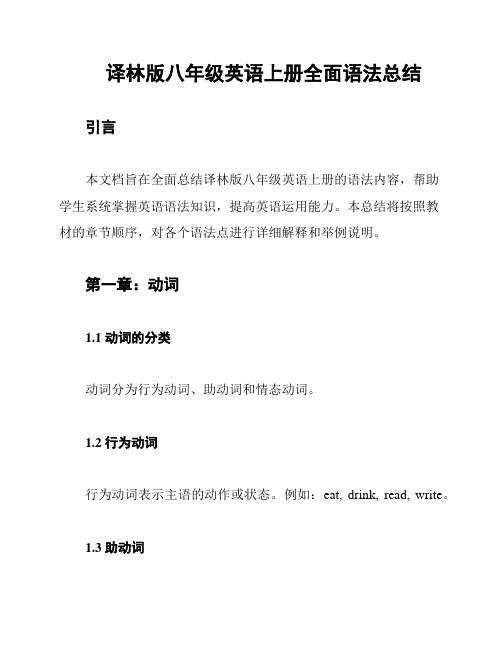
译林版八年级英语上册全面语法总结引言本文档旨在全面总结译林版八年级英语上册的语法内容,帮助学生系统掌握英语语法知识,提高英语运用能力。
本总结将按照教材的章节顺序,对各个语法点进行详细解释和举例说明。
第一章:动词1.1 动词的分类动词分为行为动词、助动词和情态动词。
1.2 行为动词行为动词表示主语的动作或状态。
例如:eat, drink, read, write。
1.3 助动词助动词帮助行为动词构成时态、被动语态和疑问句。
例如:have, do, can, may。
1.4 情态动词情态动词表示可能性、能力、建议等。
例如:can, may, must, shall, will。
1.5 动词时态动词时态表示动作发生的时间。
包括一般现在时、一般过去时、一般将来时、现在进行时、过去进行时、现在完成时和过去完成时。
1.6 动词短语动词短语由动词和其宾语、状语等组成。
例如:see sb. do sth., make sb. do sth.第二章:名词和冠词2.1 名词名词表示人、事物、地点等。
例如:boy, girl, book, city。
2.2 冠词冠词用于修饰名词,分为不定冠词和定冠词。
不定冠词有a和an,定冠词有the。
2.3 名词所有格名词所有格表示某物的主人或所属关系。
例如:Tom's book, the girls' teacher。
第三章:代词3.1 代词的分类代词分为人称代词、物主代词、反身代词、指示代词、疑问代词和不定代词。
3.2 人称代词人称代词表示人称。
例如:I, you, he, she, it, we, they。
3.3 物主代词物主代词表示所有关系。
例如:my, your, his, her, its, our, their。
3.4 反身代词反身代词表示动作的反射。
例如:myself, yourself, himself, herself, itself, ourselves, yourselves, themselves。
译林版英语八上全册语法复习
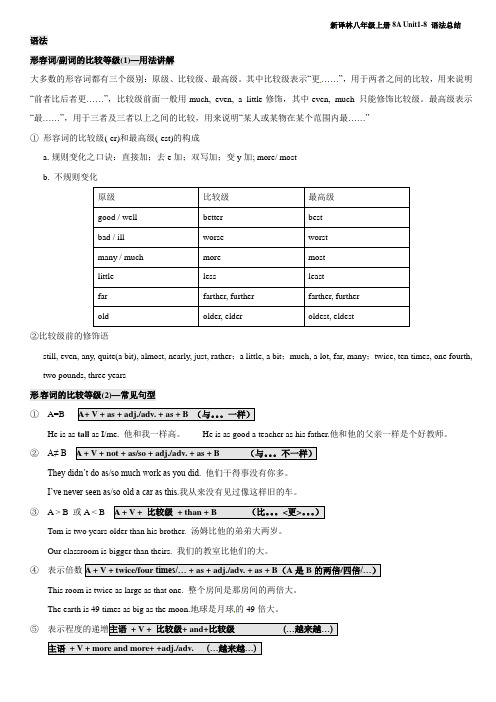
语法形容词/副词的比较等级(1)—用法讲解大多数的形容词都有三个级别:原级、比较级、最高级。
其中比较级表示“更……”,用于两者之间的比较,用来说明“前者比后者更……”,比较级前面一般用much, even, a little修饰,其中even, much 只能修饰比较级。
最高级表示“最……”,用于三者及三者以上之间的比较,用来说明“某人或某物在某个范围内最……”①形容词的比较级(-er)和最高级(-est)的构成a.规则变化之口诀:直接加;去e加;双写加;变y加; more/ mostb. 不规则变化原级比较级最高级good / well better bestbad / ill worse worstmany / much more mostlittle less leastfar farther, further farther, furtherold older, elder oldest, eldest②比较级前的修饰语still, even, any, quite(a bit), almost, nearly, just, rather;a little, a bit;much, a lot, far, many;twice, ten times, one fourth, two pounds, three years形容词的比较等级(2)—常见句型①A=B A+ V + as + adj./adv. + as + B (与。
一样)He is as tall as I/me. 他和我一样高。
He is as good a teacher as his father.他和他的父亲一样是个好教师。
②A≠ B A + V + not + as/so + adj./adv. + as + B (与。
不一样)They didn’t do as/so much work as you did. 他们干得事没有你多。
新译林英语八年级上册unit1-8词组句型、知识点(最全已排版直接打印)
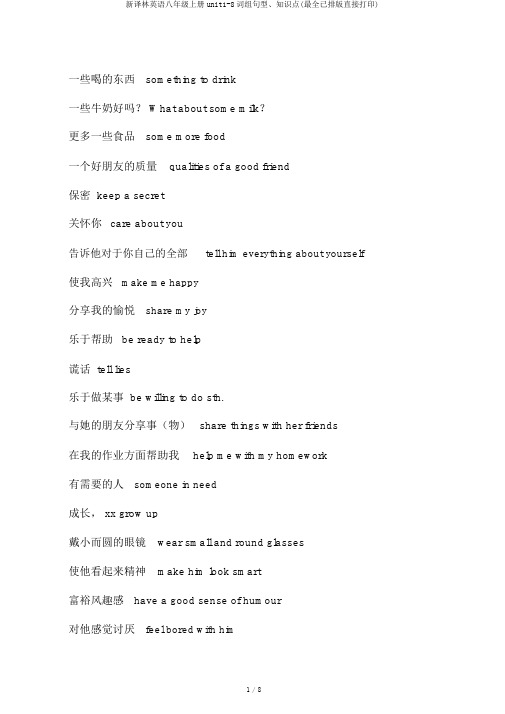
一些喝的东西something to drink一些牛奶好吗? What about some milk?更多一些食品some more food一个好朋友的质量qualities of a good friend保密 keep a secret关怀你care about you告诉他对于你自己的全部tell him everything about yourself 使我高兴make me happy分享我的愉悦share my joy乐于帮助be ready to help谎话 tell lies乐于做某事 be willing to do sth.与她的朋友分享事(物)share things with her friends在我的作业方面帮助我help me with my homework有需要的人someone in need成长, xx grow up戴小而圆的眼镜wear small and round glasses使他看起来精神make him look smart富裕风趣感have a good sense of humour对他感觉讨厌feel bored with him1 / 8我的桌walk past our desks将我的撞到地上knock our books onto the floor任何人的坏say a bad word about anyone老人友善be kind to old people在未来in the future挑某人作你最好的朋友choose sb. as your best friend对于我未来的划talk about our future plans仔听某人listen to sb. carefully游世界travel around the world想要成一名社工would like to be a social worker品works of art学更多对于。
牛津译林版八年级英语上册全册知识点归纳总结

新译林8A 英语全册知识点归纳总结8A Unit 1 Friends一、词汇大集合1. keep a secret 保守秘密2. care about 关心、关怀3. tell a lie (to sb.) (对某人)说谎4. lie - lied - lied 说谎lie —lay —lai n 躺5. play a joke on sb. 跟某人开玩笑6. tell sb. funny jokes 给某人讲可笑的笑话7. be willing to do sth. 愿意做某事、乐意做某事be ready to do sth. 乐意做某事、准备好做某事8. have a good sense of humour 有很好的幽默感= be (very) humorous9. in height 在高度方面10. in weight 在体重方面11. patient --- impatient12.in a low voice 低声地13. buy two more books= buy another two books 再买两本书14. eat one more apple= eat another apple 再吃一个苹果15. share sth. with sb. 跟某人分享某物16. qualities of a good friend 好朋友的品质17. tell him everything about yourself 告诉他有关你的一切18. share my joy(不可数)/ sadness分享我的快乐/悲伤19. have problems with sth. 在某方面有问题20. have problems doing sth. 做某事有问题21. believe what he says (said) =believe his words 相信他的话22. trust sb. 信任某人23. agree to do sth. 同意做某事24. agree with sb. 同意某人的观点25.one of my best friends 我最好的朋友这一26.one of the longest rivers 最长的河流之一27.one of the most famous film stars 最著名的影星之一28. be generous / kind to sb. 对某人慷慨/友善29. be ready to help people any time 在任何时候乐意帮助人30. help me with my homework 在家庭作业方面帮助我31. give a seat on the bus to someone in need 在公交车上让座给有需要的人32. h ave a good/sweet voice 有个好 / 甜美的嗓音 33. w ear small round glasses 戴小小的圆框眼镜 34. m ake him look smart 使他看起来精干35. never feel bored with him 和他一起从不感到无聊 36. a boring film 一部无聊的电影37. make me thirsty 使我口渴 make sb. / sth.+adj. make me laugh 使我大笑 make sb. do sth. 38. walk past our desks=pass our desks 从我们桌子旁边经过 39. kn ock ...o nto the grou nd 把…撞到地上 knock over 撞翻 ,碰倒knock …off …把…从…上撞下来40. so interesting 如此有趣41. have big bright eyes 有双明亮的大眼睛 42. have/wear long straight hair 留长直头发 43. say a bad word about sb.=say bad things about sb. 说某人的坏话 44. a true friend一个真诚的朋友45. sth. worry sb. 某事困扰某人46. sb. be worried about sth. 某人担心某事47. choose sb. as /(to be) your best friend 选择某人作为你最好的朋友48. look smart in his small round glasses 戴着他的小圆框眼镜看起来帅 49.listen to people carefully 认真听人们倾诉50. help people with their problems 帮人们解决问题 51. make friends with sb. 跟某人交朋友 52. among the six students 在六名学生当中53. among all the Chinese artists 在所有的中国艺术家当中 54. talk about our future plans 谈论我们的未来计划 55. a small girl with a ponytail 一个扎马尾辫的女孩 55. a boy with / wearing glasses 一个戴着眼镜的男孩 56. both .... and ….. 既…又…57. b e/ make / become an excellent teacher 成为一名优秀的教师 58. feel bored or unhappy 感觉无聊或不开心59.like her bright smiling eyes 喜欢她明亮略带微笑的眼睛 60. w ear/have a smile on one 's face 面带微笑 二、句型大集合 1. Can I have something to drink? 2. Can I have some more food? 3. There is nothing in the fridge.冰箱里什么也没有。
译林版英语八年级上册语法汇总

译林版英语八年级上册语法汇总第一章:时态1.1 一般现在时- 定义:表示经常性、习惯性的动作或存在的状态。
- 构成:主语 + 动词原形。
1.2 一般过去时- 定义:表示过去发生的动作或存在的状态。
- 构成:主语 + 动词过去式。
1.3 一般将来时- 定义:表示将来要发生的动作或存在的状态。
- 构成:主语 + will + 动词原形或主语 + be going to + 动词原形。
第二章:被动语态2.1 被动语态的构成- 一般现在时:主语 + am/is/are + 过去分词 + by + 动作执行者。
- 一般过去时:主语 + was/were + 过去分词 + by + 动作执行者。
- 一般将来时:主语 + will be + 过去分词 + by + 动作执行者。
2.2 被动语态的用法- 强调动作的承受者而非执行者。
- 在没有明确动作执行者的情况下使用。
第三章:情态动词3.1 can- 定义:表示能力、可能性、请求或允许。
- 构成:主语 + can + 动词原形。
3.2 may- 定义:表示可能性、请求或允许。
- 构成:主语 + may + 动词原形。
3.3 must- 定义:表示必须、肯定或推测。
- 构成:主语 + must + 动词原形。
- 否定:主语 + must not + 动词原形。
3.4 shall- 定义:表示承诺、警告或征求对方意见。
- 构成:主语 + shall + 动词原形。
3.5 will- 定义:表示意志、承诺或将来事实。
- 构成:主语 + will + 动词原形。
第四章:代词4.1 人称代词- 主格:I, you, he, she, it, we, they。
- 宾格:me, you, him, her, it, us, them。
4.2 物主代词- 形容词性:my, your, his, her, its, our, their。
- 名词性:mine, yours, his, hers, its, ours, theirs。
牛津译林版八年级上册全册语法知识点复习总结

牛津译林版八年级上册全册语法知识点复习总结一、形容词的比较级和最高级1. 形容词的比较级用于两个人或事物之间的比较,其结构如下:主语+谓语动词(系动词)+形容词比较级+than+比较对象。
2. 形容词最高级的由用法:形容词最高级用于三者或三者以上的人或物进行比较,其结构为:主语+谓语动词(系动词)+the+形容词最高级+名词+表示范围的短语或从句。
3. 形容词的比较级和最高级是在形容词原级的基础上变化的,分为规则变化和不规则变化。
①规则变化①不规则变化二、比较事物的数量1. 两者之间比较通常用more..than/ less... than 和fewer..than来比较两种事物之间的数量关系。
其中more... than之间加可数名间的复数形式或者不可数名词,less... than 之间加不可数名词,fewer...than 之间加可数名词的复数形式。
例:I has more apples than Lily.我的苹果比莉莉的多。
He eats less food than I for breakfast.他早饭比我吃得少。
Bobby has fewer books than Tim.波比的书比蒂姆的少。
2. 三者或三者以上比较通常用the most、the least、the fewest 来比较三者或三者以上事物之间的数量关系。
the most、the fewest、the least 分别是many/much、few、little 的最高级。
the most 表示“最…;最多”,其后既可接可数名词又可接不可数名词;the fewest 表示“最少”,其后接可数名词的复数形式;the least 表示“最少”,其后接不可数名词。
例:Jack gets the most points of the three boys.在三个男孩中,杰克的得分是最高的。
He has the least milk among them. 他的牛奶是他们之中最少的。
牛津译林版八年级英语上册Unit3语法重点总结

牛津译林版八年级英语上册Unit3语法重点总结一、一般现在时 (Simple Present Tense)- 表示经常性的动作、惯或事实- 常用的时间状语:always, usually, often, sometimes, everyday/week/month/year二、一般过去时 (Simple Past Tense)- 表示过去发生的动作或状态- 常用的时间状语:yesterday, last week/month/year, in 2010, etc.三、现在进行时 (Present Continuous Tense)- 表示现在正在进行的动作- 结构:主语 + am/is/are + 动词的现在分词 (-ing)- 常用的时间状语:now, at the moment, currently, etc.四、过去进行时 (Past Continuous Tense)- 表示过去某个时间正在进行的动作- 结构:主语 + was/were + 动词的现在分词 (-ing)- 常用的时间状语:at that time, while, etc.五、一般将来时 (Simple Future Tense)- 表示将来发生的动作或情况- 结构:主语 + will + 动词原形- 常用的时间状语:tomorrow, next week/month/year, in the future, etc.六、现在完成时 (Present Perfect Tense)- 表示过去发生的动作对现在产生的影响或结果- 结构:主语 + have/has + 动词的过去分词- 常用的时间状语:already, yet, so far, recently, etc.七、过去完成时 (Past Perfect Tense)- 表示过去某个时间或动作之前已经完成的动作- 结构:主语 + had + 动词的过去分词- 常用的时间状语:before, after, by the time, etc.八、将来完成时 (Future Perfect Tense)- 表示将来某个时间之前已经完成的动作- 结构:主语 + will have + 动词的过去分词- 常用的时间状语:by next week/month/year, etc.九、情态动词 (Modal Verbs)- 表示能力、可能性、允许性、必要性等- 常用的情态动词:can, could, may, might, must, shall, should, ought to, will, would以上是牛津译林版八年级英语上册Unit 3的语法重点总结。
牛津译林版八年级上册英语期末复习:各单元语法要点总结汇编

牛津译林版八年级上册英语期末复习:各单元语法要点总结汇编Unit1/unit2形容词、副词的比较级和最高级1、形容词、副词比较级和最高级词汇变化规则1)大多数短形容词(adj.)或副词(adv.)(单音节和少数双音节):直接加er est:long fast以e结尾的直接加r st:nice以“辅音字母+y”结尾的:去y+ier iest:easy以“一个元音+一个辅音字母”结尾的:双写辅音字母+er est (重读闭音节):big2)长形容词(两个以上):more+形/副most+形/副:important3) 不规则(死背)good/well :Bad/badly:many/much:little:far:2、形容词、副词比较级和最高级句型用法1)比较级:两者比较,“形容词或副词比较级+than”(根据上下文,than可以省略) E.g.Tom is much taller than Mary. (注意:much可以修饰比较级“......得多”)Tom runs faster than Mary.比较级正常没有the,特殊句型除外than后面主宾格问题:主语比较(且没有宾语),than后面没有谓语动词:主宾格都可(考试以学校老师的讲解为标准),但than后面出现谓语动词只能主格。
E.g. He is taller than she/her. He is taller than she is.He plays better than she/her.He plays better than she does.宾语比较只能宾格(试比较下面两句意思)E.g. He knows her better than I. 翻译He knows her better than me. 翻译2)最高级:三者及以上比较,the+最高级+(比较范围)可接序数词E.g. The building is the tallest in the country.The building is the second tallest in the country.注意in 和of的选择:E.g. She is the tallest of the three students.3、数量比较的四个形式多:more+名词+than, the most少:fewer/less+名词+than, the fewest/least这时不翻译成“更/最”,而要翻译成“更多或最多/更少或最少”注意比较差别:more students more beautiful4、同级比较(unit3)as...as “和......一样”否定:not as/so...as“不及,不如”=less+原级或反义词比较级+thanE.g. Mr Wu is as happy as the two girls.The two girls are not as tall as Mr Wu.=The two girls are shorter than Mr Wu. 根据形容词选择I think English is not so important as Chinese.=I think English is less important than Chinese.5、特殊用法1)固定句型形容词最高级前若有不定冠词a时,不表示比较,而表示“非常”之意:试比较下两句话:E.g. Spring is a best season.Spring is the best season.比较级+and+比较级(短)/more and more+原级(长)“越来越”E.g. better and better more and more beautiful(长单词不需要重复a.或adv.)两种情况同时变化“the+比较级,the+比较级”“越......越......”E.g. The older I get, the happier I feel.2)同义转换E.g. Li lei is the tallest student in his class.=Li lei is taller than any other student in his class.E.g. I think English is not so important as Chinese.=I think English is less important than Chinese.Less +a.原级+than仅用于长单词短单词要换反义词,见下E.g. The model bridge isn’t as tall as the real one.=The model bridge is shorter than the real one.Unit3 反身代词1、单词形式:注意单复数从我自己开始默写2、用法1)放动词或者介词后做宾语E.g. enjoy oneself do sth. by oneself2)做表语或同位语E.g. I am not myself today. 我今天不在状态The thing itself is not important.3)在不强调的情况下,but,except,for等介词后宾语用反身代词或人称代词宾格均可。
八上译林版英语知识点总结
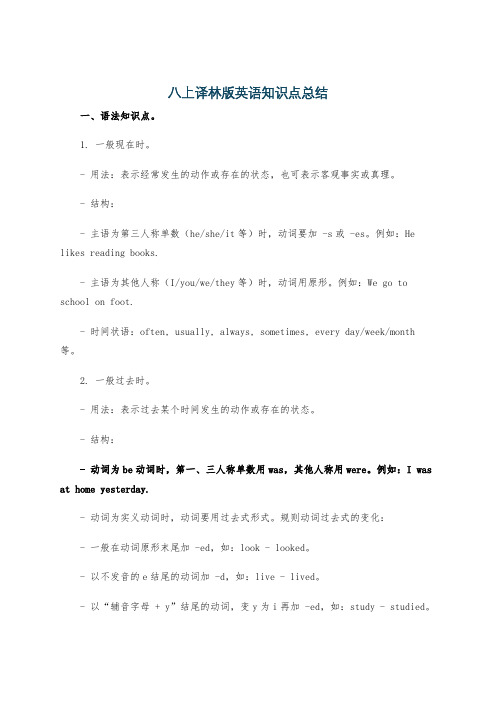
八上译林版英语知识点总结一、语法知识点。
1. 一般现在时。
- 用法:表示经常发生的动作或存在的状态,也可表示客观事实或真理。
- 结构:- 主语为第三人称单数(he/she/it等)时,动词要加 -s或 -es。
例如:He likes reading books.- 主语为其他人称(I/you/we/they等)时,动词用原形。
例如:We go to school on foot.- 时间状语:often, usually, always, sometimes, every day/week/month等。
2. 一般过去时。
- 用法:表示过去某个时间发生的动作或存在的状态。
- 结构:- 动词为be动词时,第一、三人称单数用was,其他人称用were。
例如:I was at home yesterday.- 动词为实义动词时,动词要用过去式形式。
规则动词过去式的变化:- 一般在动词原形末尾加 -ed,如:look - looked。
- 以不发音的e结尾的动词加 -d,如:live - lived。
- 以“辅音字母 + y”结尾的动词,变y为i再加 -ed,如:study - studied。
- 重读闭音节且末尾只有一个辅音字母的动词,双写这个辅音字母再加 -ed,如:stop - stopped。
- 时间状语:yesterday, last week/month/year, just now等。
3. 形容词和副词的比较级和最高级。
- 比较级的构成:- 单音节形容词和部分双音节形容词,一般在词尾加 -er。
例如:tall - taller。
- 以e结尾的形容词,加 -r。
例如:nice - nicer。
- 以重读闭音节结尾且末尾只有一个辅音字母的形容词,双写这个辅音字母再加-er。
例如:big - bigger。
- 部分双音节和多音节形容词,在前面加more。
例如:beautiful - more beautiful。
译林版八年级英语上册语法知识点总结

译林版八年级英语上册语法知识点总结本文档总结了译林版八年级英语上册的语法知识点,帮助学生复和掌握重要的语法规则和用法。
1. 时态- 现在时态:表示现在的状态、惯或定时事件,常用现在简单时。
- Eg: I play basketball every day.- 过去时态:表示过去的动作或状态,常用过去简单时。
- Eg: We watched a movie yesterday.- 将来时态:表示将来要发生的动作或状态,常用将来简单时。
- Eg: We will have a party next week.2. 语态- 主动语态:表示主语是动作的执行者。
- Eg: The dog chased the cat.- 被动语态:表示主语是动作的承受者。
- Eg: The cat was chased by the dog.3. 名词- 可数名词:可以用a/an和数字修饰,有单数和复数形式。
- Eg: a cat, two cats- 不可数名词:不能用a/an修饰,只有单数形式。
- Eg: water, information4. 代词- 主格代词:作为主语或表语时使用。
- Eg: I, he, she, they- 宾格代词:作为宾语时使用。
- Eg: me, him, her, them- 物主代词:表示所属关系。
- Eg: my, his, her, their5. 形容词和副词- 形容词:修饰名词,通常放在名词前。
- Eg: a beautiful girl- 副词:修饰动词、形容词或副词,通常放在其后。
- Eg: She sings beautifully.6. 介词和介词短语- 介词:表示时间、地点、原因、方式等关系。
- Eg: in, at, on, for, with- 介词短语:由介词加上名词短语构成。
- Eg: in the park, at home7. 情态动词- 情态动词:表示说话者的意愿、能力、推测或建议等。
译林版八年级英语上册全面语法总结

译林版八年级英语上册全面语法总结Unit 1: Present Simple Tense- The present simple tense is used to talk about general truths, habits, and routines.- It is formed by adding the base form of the verb to the subject.- Example: She always goes to the park on Sundays.Unit 2: Present Continuous Tense- The present continuous tense is used to talk about actions happening at the moment of speaking or around the present time.- It is formed by using the verb "to be" followed by the present participle form of the main verb.- Example: They are playing football in the park right now.Unit 3: Past Simple Tense- The past simple tense is used to talk about actions that happened and finished in the past.- Regular past simple verbs are formed by adding "-ed" to the base form of the verb.- Example: We visited our grandparents last weekend.Unit 4: Past Continuous Tense- The past continuous tense is used to talk about actions that were in progress at a specific time in the past.- It is formed by using the past tense of the verb "to be" followed by the present participle form of the main verb.- Example: They were watching a movie when I called them.Unit 5: Future with "going to"- The future with "going to" is used to talk about planned or intended actions in the future.- It is formed by using the verb "to be" followed by "going to" and the base form of the main verb.- Example: She is going to travel to Europe next summer.Unit 6: Future with Present Continuous Tense- The future with present continuous tense is used to talk about scheduled or arranged future events.- It is formed by using the present continuous tense of the verb "to be" followed by the present participle form of the main verb.- Example: We are having a party tomorrow.Unit 7: Modal Verbs: Can, Could, and May- Modal verbs are used to express ability, possibility, and permission.- "Can" is used for present ability, "could" for past ability, and "may" for permission or possibility.- Example: She can speak French fluently.Unit 8: Modal Verbs: Must, Mustn't, and Needn't- Modal verbs "must" and "mustn't" are used to express obligation and prohibition, while "needn't" is used to express the absence of necessity.- Example: You must finish your homework before going out.Unit 9: Modal Verbs: Should and Had Better- Modal verbs "should" and "had better" are used to give advice or make suggestions.- They can also express expectation or probability.Unit 10: Passive Voice- The passive voice is used when the focus is on the action rather than the subject.- It is formed by using a form of the verb "to be" followed by the past participle form of the main verb.- Example: The book was written by a famous author.Unit 11: Reported Speech- Reported speech is used to report what someone else has said.- It involves changing the tense and pronouns of the original sentence.Unit 12: Conditional Sentences (Type 1)- Conditional sentences type 1 express possible or likely situations in the present or future.- They consist of an if-clause (conditional clause) and a main clause.- Example: If it rains, we will stay at home.Unit 13: Conditional Sentences (Type 2)- Conditional sentences type 2 express hypothetical or unreal situations in the present or future.- They consist of an if-clause (conditional clause) and a main clause.- Example: If I had more time, I would travel the world.Unit 14: Conditional Sentences (Type 3)- Conditional sentences type 3 express hypothetical or unreal situations in the past.- They consist of an if-clause (conditional clause) and a main clause.- Example: If she had studied harder, she would have passed the exam.Unit 15: Relative Pronouns- Relative pronouns are used to join two sentences together and show a relationship between them.- Example: The book, which I bought yesterday, is very interesting.Unit 16: Adverbial Clauses of Time- Adverbial clauses of time are used to indicate when an action happens in relation to the main clause.- Example: I will call you when I arrive at the airport.Unit 17: Adverbial Clauses of Cause and Effect- Adverbial clauses of cause and effect explain why something happens or the result of an action.- Example: He couldn't sleep because he drank too much coffee.Unit 18: Adverbial Clauses of Condition- Adverbial clauses of condition indicate the condition under which the main clause will happen.- Example: If it snows, we will go skiing.Unit 19: Adverbial Clauses of Purpose- Adverbial clauses of purpose explain the reason or purpose for an action.- Example: She studied hard so that she could pass the exam.Unit 20: Adverbial Clauses of Contrast- Adverbial clauses of contrast show a difference or contrast between two actions or situations.- Example: Although it was raining, they went for a walk.Unit 21: Adverbial Clauses of Concession- Adverbial clauses of concession express a concession or contrast to the main clause.- Example: Despite feeling tired, she continued working.Unit 22: Adverbial Clauses of Manner- Adverbial clauses of manner describe how an action is done or the way in which something happens.- Example: She spoke to him as if she knew him well.Unit 23: Adverbial Clauses of Place- Adverbial clauses of place indicate the place or location where an action happens.- Example: I will meet you where we first met.Unit 24: Adverbial Clauses of Result- Adverbial clauses of result show the result or consequence of an action in the main clause.- Example: She studied hard so that she could get good grades.。
译林版英语八年级上册语法汇总

译林版英语八年级上册语法汇总本文档将对译林版英语八年级上册的语法进行汇总和总结。
以下是各单元的语法重点:Unit 1: Greetings- 问候语:Hello, Hi, Good morning, Good afternoon, Good evening- 介绍自己:My name is..., I am from...- 问候他人:How are you?, How do you do?, Nice to meet youUnit 2: School Subjects- 询问学科:What subjects do you have?, What's your favorite subject?, Do you like...?- 回答学科:I have English, Math, Science, etc., My favorite subject is..., Yes, I like...Unit 3: Hobbies- 询问爱好:What are your hobbies?, Do you like...?, What do you like doing in your free time?- 回答爱好:My hobbies are..., Yes, I like..., In my free time, I enjoy...Unit 4: Daily Routine- 描述日常活动:I get up at..., I have breakfast at..., I go to school at..., I have lunch at..., I do my homework at..., I go to bed at...- 询问日常活动:When do you...?, What time do you...?, What do you do at...?Unit 5: Food and Drinks- 表示喜好:I like..., I love..., I don't like..., I hate...- 询问喜好:Do you like...?, What's your favorite food/drink?, Would you like...?Unit 6: Family- 介绍家庭成员:This is my..., He/She is my..., I have...in my family.- 询问家庭成员:Do you have any brothers/sisters?, How many people are there in your family?, Who's in your family?Unit 7: Describing People- 描述外貌特征:He/She has... (e.g., short hair, big eyes, a small nose)- 描述个性特征:He/She is... (e.g., kind, friendly, smart, funny) - 询问外貌和个性:What does he/she look like?, What is he/she like?Unit 8: Places and Directions- 表示位置:It's on/in/under/next to/near...- 询问位置:Where is...?, How do I get to...?, Can you tell me the way to...?Unit 9: Daily Life- 描述日常活动:I usually..., I often..., I sometimes..., I never...- 描述频率:always, usually, often, sometimes, neverUnit 10: Weather- 描述天气:It's sunny/cloudy/rainy/windy/snowy, etc.- 询问天气:What's the weather like today?, How's the weather?以上是译林版英语八年级上册的语法汇总,通过掌握这些语法知识,你将能够更好地理解和运用英语。
(word完整版)新译林八年级上册语法总结,推荐文档
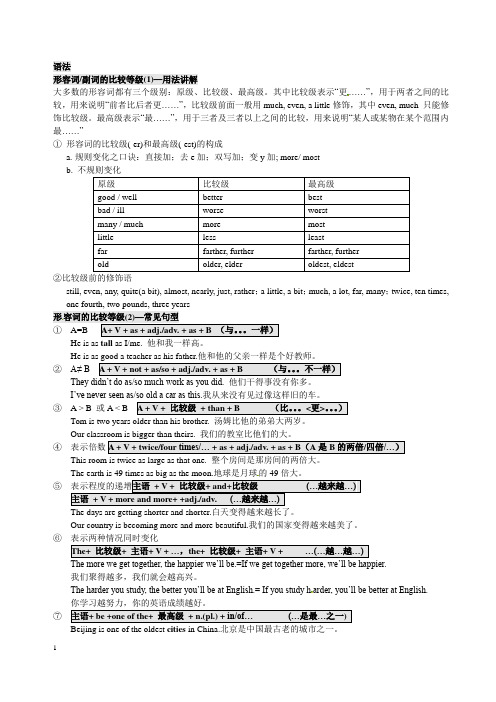
语法形容词/副词的比较等级(1)—用法讲解大多数的形容词都有三个级别:原级、比较级、最高级。
其中比较级表示“更……”,用于两者之间的比较,用来说明“前者比后者更……”,比较级前面一般用much, even, a little修饰,其中even, much 只能修饰比较级。
最高级表示“最……”,用于三者及三者以上之间的比较,用来说明“某人或某物在某个范围内最……”①形容词的比较级(-er)和最高级(-est)的构成a.规则变化之口诀:直接加;去e加;双写加;变y加; more/ mostb. 不规则变化原级比较级最高级good / well better bestbad / ill worse worstmany / much more mostlittle less leastfar farther, further farther, furtherold older, elder oldest, eldest②比较级前的修饰语still, even, any, quite(a bit), almost, nearly, just, rather;a little, a bit;much, a lot, far, many;twice, ten times, one fourth, two pounds, three years形容词的比较等级(2)—常见句型①A=B A+ V + as + adj./adv. + as + B (与。
一样)He is as tall as I/me. 他和我一样高。
He is as good a teacher as his father.他和他的父亲一样是个好教师。
②A≠ B A + V + not + as/so + adj./adv. + as + B (与。
不一样)They didn’t do as/so much work as you did. 他们干得事没有你多。
- 1、下载文档前请自行甄别文档内容的完整性,平台不提供额外的编辑、内容补充、找答案等附加服务。
- 2、"仅部分预览"的文档,不可在线预览部分如存在完整性等问题,可反馈申请退款(可完整预览的文档不适用该条件!)。
- 3、如文档侵犯您的权益,请联系客服反馈,我们会尽快为您处理(人工客服工作时间:9:00-18:30)。
语法形容词/副词的比较等级(1)—用法讲解大多数的形容词都有三个级别:原级、比较级、最高级。
其中比较级表示“更……”,用于两者之间的比较,用来说明“前者比后者更……”,比较级前面一般用much, even, a little修饰,其中even, much 只能修饰比较级。
最高级表示“最……”,用于三者及三者以上之间的比较,用来说明“某人或某物在某个范围内最……”①形容词的比较级(-er)和最高级(-est)的构成a.规则变化之口诀:直接加;去e加;双写加;变y加; more/ mostb. 不规则变化原级比较级最高级good / well better bestbad / ill worse worstmany / much more mostlittle less leastfar farther, further farther, furtherold older, elder oldest, eldest②比较级前的修饰语still, even, any, quite(a bit), almost, nearly, just, rather;a little, a bit;much, a lot, far, many;twice, ten times, one fourth, two pounds, three years形容词的比较等级(2)—常见句型①A=B A+ V + as + adj./adv. + as + B (与。
一样)He is as tall as I/me. 他和我一样高。
He is as good a teacher as his father.他和他的父亲一样是个好教师。
②A≠ B A + V + not + as/so + adj./adv. + as + B (与。
不一样)They didn’t do as/so much work as you did. 他们干得事没有你多。
I’ve never seen as/so old a car as this.我从来没有见过像这样旧的车。
③ A > B 或A < B A + V + 比较级+ than + B (比。
<更>。
)Tom is two years older than his brother. 汤姆比他的弟弟大两岁。
Our classroom is bigger than theirs. 我们的教室比他们的大。
④表示倍数A + V + twice/four times/… + as + adj./adv. + as + B(A是B的两倍/四倍/…)This room is twice as large as that one. 整个房间是那房间的两倍大。
The earth is 49 times as big as the moon.地球是月球的49倍大。
⑤表示程度的递增主语+ V + 比较级+ and+比较级(…越来越…)主语+ V + more and more+ +adj./adv. (…越来越…)The days are getting shorter and shorter.白天变得越来越长了。
Our country is becoming more and more beautiful.我们的国家变得越来越美了。
⑥表示两种情况同时变化The+ 比较级+ 主语+ V + …,the+ 比较级+ 主语+ V + …(…越…越…)The more we get together, the happier we’ll be.=If we get together more, we’ll be happier.我们聚得越多,我们就会越高兴。
The harder you study, the better you’ll be at English.= If you study h arder, you’ll be better at English.你学习越努力,你的英语成绩越好。
⑦主语+ be +one of the+ 最高级+ n.(pl.) + in/of…(…是最…之一)⑧主语+ V。
+ the+ 最高级+ in/of…(…最…)⑨主语+ V。
+ the+ 比较级+ of the two…(…<两者中>较…的)⑩主语+ V。
+ 比较级+ than + any other +n. (单数) + in…(…比任何其他的更…)主语+ V。
+ 比较级+ than + any of the other +n. (复数) + in…(…比任何其他的更…)He is taller than any other student i n his class.他比他班级中其他的任何学生高。
= He is taller than any of the other students in his class. = He is the tallest students in his class.A+ V + more/ fewer + 可数名词复数+ than B …(A比B 做更多、更少。
)A+ V + more/ less + 不可数名词复数+ than B …(A比B 做更多、更少。
)Jhon studies more subjects than Nancy.Jhon比Nancy学更多科目。
Students in the USA have more weeks off in the summertime than British students.在夏天美国学生比英国学生有更多周不上课。
12. A+ V + the same (size/ colour/ age...)as + B (A与B一样)My uniform is the same as Simon’s uniform. 我的校服和Simon的校服一样.Millie’s pencil box is the same size as Amy’s pencil box. 我的铅笔盒和Amy的铅笔盒一样大。
A+ V + different from + B (A与B不一样)Kitty’s rubber is different from Simon’s rubber. Kitty的橡皮和Simon的橡皮不一样。
反身代词第一人称第二人称第三人称单数复数单数复数单数复数myself ourselves yourself yourselves himself/herself/itself themselves(1)作动词或介词的宾语:经常在enjoy, teach, hurt, buy, introduce, seat, dress, express, amuse, behave等动词和by, for, to, of等介词后作宾语。
通常表示反身代词与句中的主语是同一人。
它在句中作宾语,不能省略,否则该句是一个意义不完整的错句。
如:He is teaching herself English.她在自学英语。
She was talking to herself.她自言自语。
He lives by himself in the country.他独自住在乡下。
(2)作主语或宾语的同位语:主要起加强语气的作用,译作“亲自,本身,本人”。
如:Did you make the cake yourself?这蛋糕是你亲自做的吗?(yourself作主语you的同位语)The work itself is easy.这工作本身很容易。
(itself作主语the work的同位语)Did you see Mr. Wang himself?你见过王先生本人吗?(himself作宾语Mr. Wang的同位语)(3)作表语:在be, feel, look, seem等系动词后作表语,表示身体或精神状态处于正常。
如:I’m not myself today.今天我感觉不舒服。
I am feeling myself again.我觉得健康如昔。
祈使句讲解一、祈使句:用于表达命令、请求、劝告、警告、禁止等的句子叫做祈使句. 祈使句的作用是要求、请求或命令、劝告、建议别人做或不做一件事。
祈使句的句末一般用感叹号,但是有些祈使句的语气较弱,可以用句号结尾祈使句因对象(即主语)是第二人称,所以通常都省略。
祈使句的动词都为一般现在时,例:Go and wash your hands. 例如:保持肃静!Be kind to our sister. Watch your steps. 表示禁止的句式有:不准、不要、别、No parking.二、表现形式●肯定结构:1. Do型(即:动词原形(+宾语)+其它成分)。
如:Please have a seat here.有的祈使句在意思明确的情况下,动词可省略。
如:This way, please. = Go this way, please. 。
2. Be型(即:Be + 表语(名词或形容词)+其它成分)。
如:Be a good boy! 要做一个好孩子!3. Let型(即:Let + 宾语+ 动词原形+ 其它成分)。
如:Let me help you. 让我来帮你。
●否定结构:1. Do型和Be型的否定式都是在句首加don\'t构成,如:Don\'t forget me!Don\'t be late for school!2. Let型的否定式有两种:“Don\'t + let + 宾语+ 动词原形+ 其它成分”和“Let + 宾语+ not + 动词原形+ 其它成分”。
如:Don\'t let him go. / Let him not go. 别让他走。
3. 有些可用no开头,用来表示禁止性的祈使句。
如:No smoking! No fishing! 禁止钓鱼!用"let"的祈使句时,必须注意下列几点:1、"let" 的否定句有二。
如果宾语是第三人称用"Don't let....."(见例(9));如果宾语是第一人称,则用"Let......not" (见例(10)):2、"Let"只适用于现在时态,可以有被动语态(the passive voice),如:Let the recalcitrant criminals be sent to prison. Let all the dedicated capable staff be promoted.3、"Let"后头除了是不带"to"的不定式动词(The infinitive without"to")之外,还可以是某些适当的副词,如out, in, down, alone等:Let the puppy out. Open the windows and let the fresh air in.The room is too sunny. Let the blinds down. Let me alone, please.用"Let\'s"时,把谈话者的对象包括在内;用"Let us"时,并不包括对方,如:Let's try it, shall we? Let us do it by ourselves, will you?里的"shall we"和(18)里的"will you",不难知道前者包括听话人,后者并没有。
